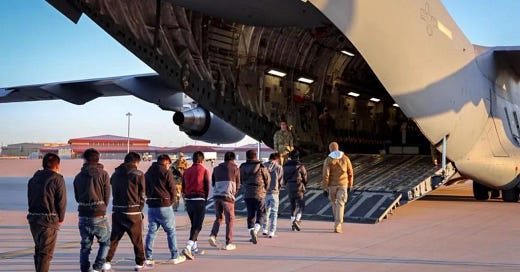Unregulated & uncontrolled immigration
Trump seeks to rectify a historic crime of the political establishment
As all the world knows, President Donald Trump has issued a flurry of executive orders, seeking to move rapidly and effectively toward attainment of the announced objectives of the MAGA movement. Among them are several orders designed to stop illegal immigration and to deport individuals who reside in the United States without documentation and authorization. In today’s commentary, I review the executive orders on immigration, seeking to make clear their directives and their rationale. I then address relevant questions: Do States have a right to regulate migration? What are the causes of uncontrolled international migration? Is international migration a solution to the problems of global inequality and world poverty? What is a solution to the migratory crisis, and what would it take to attain it? Is there a common human interest?
§
The content and rationale of the executive orders on immigration
The Executive Order…



